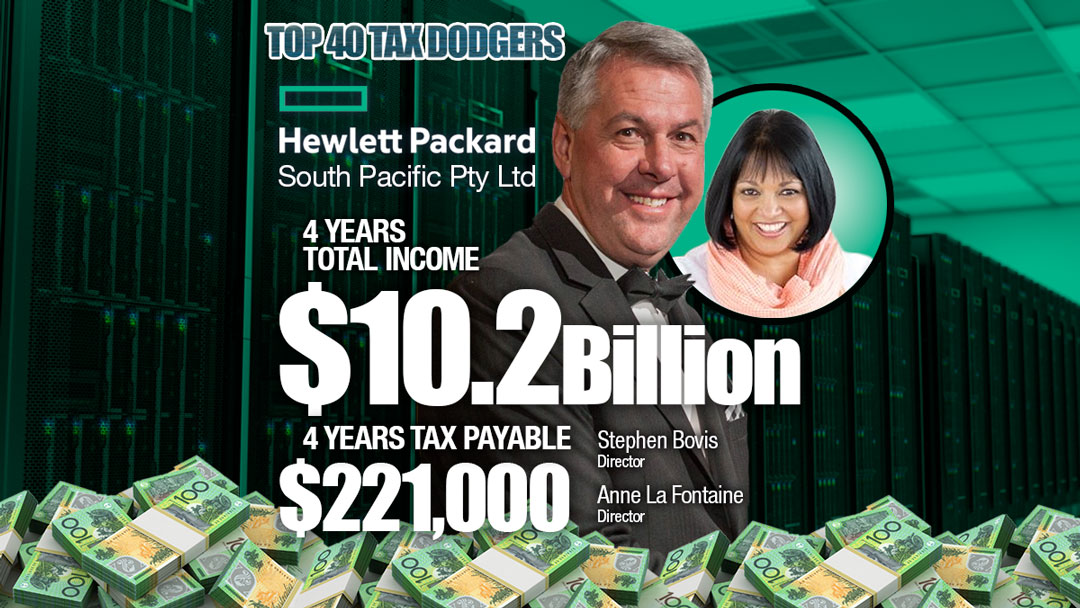Hewlett Packard South Pacific Pty Ltd
| 4 year total income | $10,202,422,655 |
| 4 year taxable income | $738,072 |
| Margin | 0.01% |
| 4 year tax payable | $221,422 |
| Tax Rate | 30.00% |
| Auditor | EY |
| Industry | IT |
| Links |
This won’t be paying any tax in Australia for a long time. A morass of restructuring losses and related party finance costs, Hewlett Packard actually paid income tax at the full, statutory rate of 30 per cent.
But like Foxtel at #24 and ING Bank at #37 on the Top 40 Tax Dodgers chart – which also show a tax rate of 30 per cent – the story here is about eliminating billions in total income to reduce taxable income to almost zero.
Unlike Foxtel, which appears to be a more brazenly obvious tax shirker, HP is a corporate basket case It would be insolvent were it not for a guarantee from its parent companies.
It’s latest set of financial statements for 2017 show how HP generated losses from a series of restructures which began in 2016. It has hived off businesses to related parties in Singapore and elsewhere and halved its cash-flow from more than $2 billion a year to less than $1 billion a year.
What the accounts do reveal is that executives here are remunerated with stock and stock options in the parent company HP in the US. They are therefore incentivised to perform for a foreign company which makes higher profits if HP pays no tax in Australia. They are not incentivised therefore to maximise taxable income in Australia for this legal corporate entity.
This company, with its tiny board of just two directors who are remunerated with foreign stock, is little more than an agency for HP in America and should be treated and taxed as such.
Its immediate parent company is Hewlett-Packard Puerto Rico BV. Dutch domicile has favourable tax laws for IT companies.
As current liabilities dwarf current assets by $529 million, it won’t be paying tax any time soon but will be shoring up tax losses from its myriad restructuring to shelter it from tax obligations for years to come.
Public support is vital so that we can continue to investigate and publish articles that tell truth to power. Subscribe with a monthly contribution if you can, see below. Join our newsletter, share and like posts, if you can not make a financial contribute.
2019 METHODOLOGY
We are counting down the Top 40 Tax Dodgers. There are now four years of tax transparency data published by the Tax Office and we have used this data to work out which large companies operating in Australia have paid the least tax, or no tax.
Notable new economy players such as Google, eBay, Booking.com, Expedia are not near the top of the ATO list. That’s because they don’t (yet) recognise all income earned here; instead, they book Australian revenue directly to their associates offshore. They will be ranked in due course.
For other large corporations, and in particular, multinationals, the main steps in avoiding tax are made by reducing their taxable as much as they can; usually by sending it offshore in interest on loans, “service” fees or other payments to foreign associates. So, we have set a threshold. We have included only those companies which managed to wipe out 99.5 per cent or more of their taxable income over four years.
Qantas, therefore, is not on this list, although it has enormous income and has paid no income tax in Australia for many years. It misses the cut-off due to it not eliminating more than 99.5 per cent of its total income.
The airline had made large losses which were offset against profits. Many large corporations which have paid zero tax in ATO data, have legitimately made losses and have therefore built up “tax-loss shelter”.
Further explanation of methodology can be found here.
Many others however, such as ExxonMobil and EnergyAustralia, are on the list as they managed to eliminate all or most of their taxable income by “debt-loading” or other means of aggressive tax avoidance.
In this, the second iteration of michaelwest.com.au corporate tax rankings, we have ranked companies purely on the Tax Office data. We will also publish a list of Australia’s better corporate taxpayers, those companies who contribute most to the country in which they operate.
The Tax Office data is not a perfect guide. It does not record refunds, only tax payable and is often at odds with disclosures made for accounting purposes. In some cases, there are multiple entities with the same ultimate offshore parent reporting. One entity may pay zero tax, another may pay at the statutory 30 per cent rate (even if on low taxable income). We endeavour to be fair in our reporting to recognise these issues.
The data also recognises trusts as well as companies. For trusts, it is the members (investors) rather than the trusts who are ordinarily required to pay the tax. In many cases however it is fair to recognise trust structures for what they are, as tax is often the main reason these vehicles have been structured as trusts.
Companies are welcome to debate their rankings or to touch base to clarify or defend their tax practices. We will append or link these submissions.
Hydrox has been taken off the list as it never made a profit.
Michael West established Michael West Media in 2016 to focus on journalism of high public interest, particularly the rising power of corporations over democracy. West was formerly a journalist and editor with Fairfax newspapers, a columnist for News Corp and even, once, a stockbroker.

